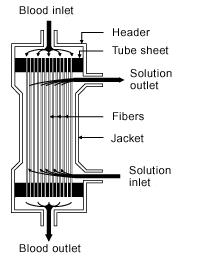My first week of kidney failure saw me in a hospital. My first two dialysis treatments were ordered by doctors and administered by nurses. There turns out to be a significant number of parameters that can be adjusted during the process. This is hardly surprising, but it reminds me that I am in the hands of experts that are doing a complex task with many adjustable parameters. The rate ate which blood is pumped through the machine is controlled. There is a cleansing solution that counter flows through the filter unit. The heart of the filter is a semipermeable membrane. To understand how the membrane works, I found it useful to read the blog entry Hemodialysis Devices: Dialyzer. Superficially, this looks a lot like the filter unit looks like a small version of my home's water softener filter. The counter flow aspect of the dialysis filter is more complex than a simple filter and gives the many more options for the operation of the filter.
My second week saw me in a for-profit dialysis center, Mercycare. It seems odd to me that a for profit institution can ask for donations, but they do. How do they balance duty to patient, shareholder profitability, community service and the Hippocratic Oath sworn by the physician?
In this second week at Mercycare, I have received three dialysis treatments. However, only one of these treatments ended with a complete treatment. On my first and third treatments, my blood coagulated in the machine. Apparently, I may need more heparin, an injectable anticoagulant. This was not an issue during my first week, when I was in hospital. I may be naive, but leaving behind a few cups of blood is likely to make me anemic. Within the tubes of the machine, you could see the blood was sticky like taffy at three hours into the four hour process. So, the staff was left with a bloody mess and I was left with less blood than expected and with dialysis that was cut short. I am feeling pretty good and the dialysis has been effective at improving my blood chemistry. But I wonder, is this really the best our society can do to organize health care delivery?
By the way, if you do a Google search for Heparin, one of your first hits is for Anapol Schwartz's law office. They claim that
Heparin has been linked to four deaths and 350 serious adverse reactions in a relatively short time span.
The Chinese plant that makes the active ingredient for heparin has no drug certification. Heparin’s prime ingredient is pig’s intestines. Without a drug certification, the Chinese equivalent to the FDA didn’t inspect the product. Isn’t anyone (quality control?) looking at the paperwork?
The U.S. FDA didn’t inspect the Chinese manufacturer before permitting it to become the biggest supplier of heparin in the United States. Think about an unregulated plant anywhere whether in the United State or China manufacturing products from pig intestines.
Oh good, we outsource drug manufacture with the same zeal we outsource iPhone manufacture. For the iPhone, Apple outsources the manufacture to Foxxcon. For Heparin, Baxter Healthcare outsources the collection of pig intestines to an unregulated plant in China. So, when I hear about the 'job killing health care bill, I can be certain that the invisible hand will be creating lots of low skill jobs in China and a few high skill jobs in the USA.
As a kid, I lived in Pella, Iowa and ate Pella Bologna. I could visit Ulrich's Meat Market and watch the butchers process the intestines. I could also go down to a slaughter house if I really wanted to. I could hardly avoid all the pigs in the country if I went for a run. So, is it possible for me to choose to get pig intestines from people who I trust (my neighbors)? Nope, I am forced to trust the invisible hand to regulate a n unnamed company that appears to have deliberately adulterated a drug that I need to live.
The other issue that I am finding is that communication with the staff is via PostIt notes. Patients interact with the technicians that run the machines. The rest of the staff writes notes that they hand to the technicians. Some times, a staff member will go and talk to the patients. We, the patients, are a captive audience, so a conversation is always welcome.
The latest note stated that the doctors and staff are moving on to examine transplant options. I find this curious. I would have thought that conversation would be part of the doctor-patient relationship, but instead is delivered by a 'social worker' via PostIt note. I was expecting somebody to have asked me for a list of blood relatives as part of this discussion, but perhaps as the 'consumer' this isn't my role just yet.
Welcome to the new world of Medicine, Inc.

No comments:
Post a Comment